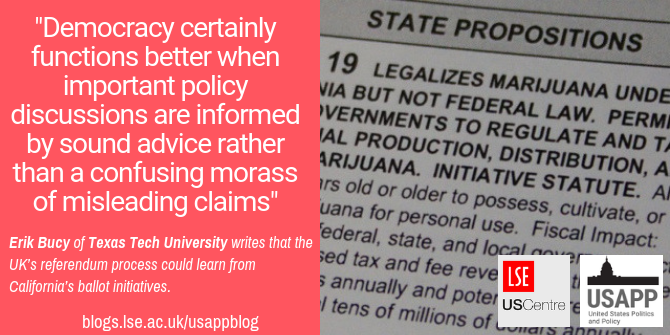 This week sees the UK parliament knee-deep in Brexit related debates, all of which stem from 2016’s non-binding referendum. Erik P. Bucy writes the current rancor in the UK over Brexit is reminiscent of California’s difficult experience with its anti-immigration Proposition 187, which had been strategically pushed by a Republican Governor in 1994. He argues that the UK may have something to learn from California’s tradition of ballot Propositions, which are not only binding but are accompanied by a dispassionate analysis of the proposed legislation and its potential effects.
This week sees the UK parliament knee-deep in Brexit related debates, all of which stem from 2016’s non-binding referendum. Erik P. Bucy writes the current rancor in the UK over Brexit is reminiscent of California’s difficult experience with its anti-immigration Proposition 187, which had been strategically pushed by a Republican Governor in 1994. He argues that the UK may have something to learn from California’s tradition of ballot Propositions, which are not only binding but are accompanied by a dispassionate analysis of the proposed legislation and its potential effects.
A little direct democracy, such as a national referendum to leave or remain in the EU (aka, ‘Brexit’) can be a dangerous and powerful thing. California voters know this all too well. Propositions and ballot initiatives have been a routine feature of the statewide electoral landscape there for over a century—and have bent numerous gubernatorial candidates to their will, whether eventually considered a good idea or not.
Once passed, popular ballot measures can have far-reaching and difficult to reverse consequences, whether to freeze taxes or impose mandatory spending (say, on schools), legalize marijuana use—or attempt to restrict public services, including health care, education, and welfare benefits to undocumented immigrants, as Proposition 187 notoriously advocated on the statewide ballot in 1994.
Echoes of Prop. 187 in the Brexit Campaign
Like Brexit, the campaign for Prop. 187 stoked xenophobic and anti-immigrant sentiment and was strategically (if not cynically) championed by then-Republican Governor Pete Wilson on his way to re-election. Four years later, the proposition was ruled unconstitutional in federal court—states don’t have the authority to regulate immigration, only the federal government does—and never went into effect. In the end, the whole effort seemed designed just to get Wilson reelected.
Many observers cite this uncomfortable moment in California history as the state’s highwater mark of reactionary impulse—and a major reason for energizing Hispanic voters, who would vote Republicans out of office. Except for Arnold Schwarzenegger’s celebrity election as governor, the political headwinds have been blowing in a more liberal, Democratic direction ever since. Granted, the comparison between a single state in the US and Britain as a nation is not entirely apt, but California stands on its own in many ways and is about as nation-like as a US state gets (by GDP it would have the 5th largest economy in the world, just ahead of the UK).
From systematic analysis it is becoming apparent that the Brexit vote was the product of stoking similar social attitudes and resentments. Besides nostalgia, some of the strongest predictors of voting to leave were nationalist sentiment and a sense that people in multicultural London were somehow financially better off and more central to British life than residents of outlying regions. Stop the flow of immigration and outflow of pounds to the EU and Britain could somehow regain its former glory while keeping more money in coffers at home.
Indeed, empty promises plastered on the sides of buses by the Leave Campaign guaranteed £350million in weekly savings to the NHS once the UK was free of the EU and no longer obligated to help pay the EU budget. It was one argument that voters across the political spectrum, particularly retirees and those more reliant on the health care system, could potentially rally around.
The Remain camp, as the Guardian and other mainstream media outlets documented, argued all along that it was wrong to claim that £350m flew out the window to Brussels each week never to be seen again, as this was an overall figure and did not take into account funds that returned in the form of farm and other subsidies, including grants for infrastructure, education and research.
Promises Made—But not Meant to Be Kept
But once passions are inflamed and disinformation is put into widespread circulation (sometimes unwittingly by the news media, in its duty to cover public debate), it is difficult to put the false-promises genie back into the sober-facts bottle. Almost two years after the vote, the government had quietly dropped at least 11 fanciful Brexit promises, including (besides a weekly infusion of £350m to the NHS) quick and easy trade deals, an end to ECJ jurisdiction and free movement, and British control of North Sea fishing.
None of this has come to pass, and UK Prime Minister Theresa May’s government has suffered several resignations on its road to negotiating a Brexit deal that almost no one is happy with, as the current debate in Parliament over the negotiated Withdrawal Agreement aptly illustrates. Recriminations are now so rife that, even before the vote in Parliament, there is already talk of an eventual Brexit inquiry about what happened and why.
News of the negotiations has been confusing, at times incoherent, and ever-more dreary. There were initial discussions about a soft Brexit, the possibility of a hard Brexit, the closed-door formation of the Chequers Plan, the option of a No Deal Brexit, don’t forget the backstop plan, recent talk of an extension to the Article 50 timeline, and now…debate about the potential debate between Theresa May and Labour leader Jeremy Corbyn. Which version of the Brexit negotiations and plans did voters actually approve? None of them, really.

“my part” by Mark is licensed under CC BY 2.0
Nor were voters in the lead-up to the 2016 Brexit vote provided with enough legal advice and dispassionate analysis necessary to make an informed decision. The Cameron government, which wanted to Remain, did post its analysis and reasons for staying in the EU (to little fanfare), but the more persuasive Leave campaign and its enablers captured public imagination with catchy slogans and over-optimistic promises. The Leave messaging sounded good but it just wasn’t true.
That’s because no one before the vote really knew what Brexit would look like. The initial vote was a pre-legislative referendum, held long before any actual Withdrawal Agreement was formulated, negotiated or debated (we’re finally at that point now, and it’s not looking good). Instead, voters were subjected to an insidious amount of misinformation during the campaign and presented with a simple either/or choice, making the process seem simpler than it was: Should the United Kingdom remain a member of the European Union or leave the European Union? That’s it.
The Need for Dispassionate Analysis
Here, California’s contrasting approach to direct democracy is again worth considering. In the weeks leadings up to an election in which propositions are on the ballot, voters are presented with a condensed legislative debate: an official title and summary of what the vote means; brief arguments both for and against the measure from the Secretary of State’s office; analysis (i.e., legal advice) by the legislative analyst; detailed arguments for and against the measure, presented dispassionately and with rebuttals by both sides; and, the full text of the proposed law, which often runs on for pages.
Unlike California’s process, the Brexit vote was non-binding. Pre-legislative referendums in the UK are merely advisory and are not intended to usurp parliamentary sovereignty. So why continue? Conservatives argue that it’s now about not betraying Leave voters. But the news about withdrawing from the European Union grows more dismal by the day.
Enough information has now leaked or been released that the prospects of just about any version of Brexit looks untenable. Economic scenarios are grim. Promised benefits illusory. Health care and quality of life likely compromised. Flow of goods and services—and talent—from the outside restricted. Border scenarios fraught. Brain drain already in progress. Choose a sector: there are no rosy forecasts. To quote Thomas Hobbes, life in the UK post-Brexit would appear to be “solitary, poor, nasty, brutish, and short.”
The Will of ‘the People’?
Still, the Leave camp continues to invoke “the will of the people” and argues that because the vote was the largest in British history, Brexit must proceed. Without a post-legislative referendum (i.e., a People’s Vote over some actual legislation)—another recognized option in the UK direct democracy tradition—the case for continuing down this road seems specious. The information environment was too anaemic and skewed, hard advice about the measure non-existent when it mattered, and impressions of what Brexit might entail chimeric.
Full information is an ideal rather than attainable state. But democracy certainly functions better when important policy discussions are informed by sound advice rather than a confusing morass of misleading claims. Despite the investment of time and person-hours in the Brexit negotiations, drafting of legal advice, and contingency planning, Parliament is under no obligation to enact any form of withdrawal after considering the government’s proposal.
Rather than extending Article 50, as some are suggesting, and leaving the country in further suspended animation over more unproductive years of withdrawal negotiations, a more prudent path would be to take a step back from this ill-conceived adventure and focus on social and economic policies that people might actually benefit from.
Please read our comments policy before commenting.
Note: This article gives the views of the author, and not the position of USAPP– American Politics and Policy, nor of the London School of Economics.
Shortened URL for this post: http://bit.ly/2rnHHc9
About the author
 Erik Bucy – Texas Tech University
Erik Bucy – Texas Tech University
Erik Bucy, a California native, is the Marshall and Sharleen Formby Regents Professor of Strategic Communication at Texas Tech University and Visiting Senior Fellow in the Department of Government at the LSE. He can be reached at erik.bucy@ttu.edu or @erikpbucy on Twitter.





I liken the Brexit debate to a collective bargaining problem.
Unions in which the leadership is strong and/or trusted allow their bargaining committee to call a strike if and when necessary without further resort to the membership. The committee bargains with a “strike mandate” from the membership and the authority to use it.
Unions with weaker bargaining positions and less trust in leadership require that an employer’s “final offer” be presented to the membership. The membership thus makes a big decision — to strike with all the risk that entails, or to accept the terms offered.
If the UK were a real representative democracy — i.e. if its citizens had equal effective votes and fair representation — then it would be obvious that its current government is not widely trusted.
Now that the consequences of Brexit are easier to appreciate, the citizens ought to be allowed to pronounce on the Brexit final offer from the EU.
But of course the UK is not a real representative democracy, it’s a shamocracy. The population is now experiencing the downside of its entrenched undemocratic political arrangements with the potential of worse to come..